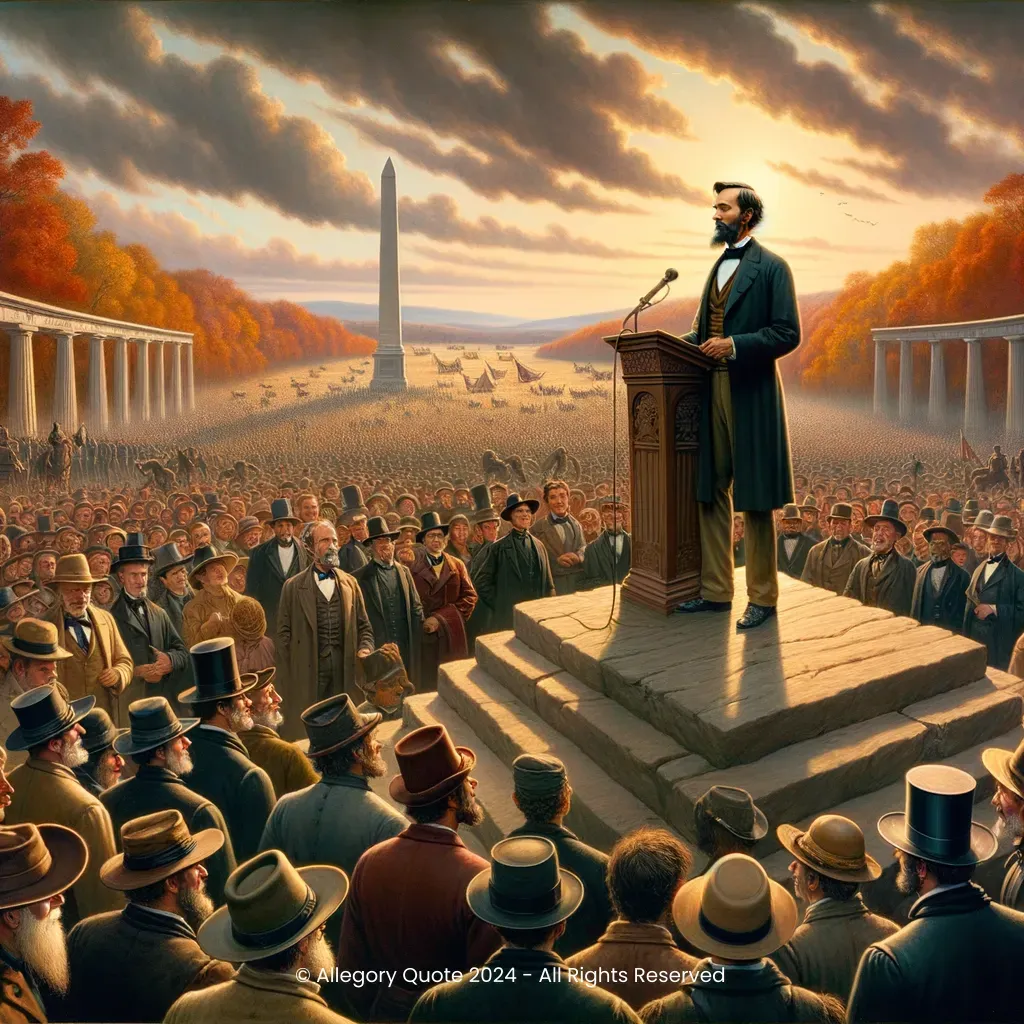”Fourscore and seven years ago our fathers
brought forth on this continent,
a new nation, conceived in Liberty,
and dedicated to the proposition that all men are created equal“

- Meaning
- This phrase reflects several deep meanings: - **Historical Context:** Lincoln is referring to the time 87 years prior, 1776, when the Declaration of Independence was signed, signaling the birth of the United States. - **Founding Principles:** The phrase underscores the founding ideals of the nation—Liberty and equality. - **Unity and Resolve:** Delivered during the Civil War, it was a call to preserve the Union and to reaffirm the nation's commitment to those founding principles amid a period of intense conflict. - **Philosophical Insight:** Implicit in the phrase is a profound belief in human equality and the importance of liberty as a fundamental right. Through this address, Lincoln sought to remind the people of the original ideals that united the nation and entreat them to recommit to those values.
- Allegory
- The image includes Abraham Lincoln, a central figure representing leadership and unyielding commitment to principles. The diverse crowd reflects the foundational idea of equality and unity, showing that despite the nation's divisions, there is a collective resolve to uphold these values. The Civil War battlefield backdrop with emerging light symbolizes hope and renewal, indicating that even in times of crisis, the nation can find its way back to its core ideals. The autumn colors tie the visual to the historical timing of the speech, while monumental columns emphasize the gravity and enduring nature of the address's message. Peaceful expressions and interactions capture the positive effect of Lincoln's words, reflecting the speech’s intent to heal and unify a wounded nation.
- Applicability
- The teaching embodied in this phrase can be applied in various ways to personal and communal life: - **Commitment to Principles:** It encourages individuals to stay true to foundational values and ideals, especially during times of challenge or conflict. - **Striving for Equality:** It reminds us of the importance of equality and justice in our daily interactions and the broader societal structures. - **Reflecting on History:** Encourages reflecting on historical foundations and learning from them to build a better future. Whether in personal growth, policy-making, community service, or leadership, the phrase encourages dedication to core values and perseverance through adversity.
- Impact
- The impact of this phrase and the Gettysburg Address as a whole has been profound. It has inspired countless movements for equality and justice throughout American history, including the civil rights movement. It is often cited in discussions about American values, patriotism, and the enduring quest for a just society. The speech's message of national unity and moral integrity continues to resonate deeply, making it a touchstone for American identity and aspirations.
- Historical Context
- The Gettysburg Address was delivered on November 19, 1863. The Civil War was ongoing, and it was a pivotal moment for the country. The Battle of Gettysburg had occurred just a few months earlier, marked as one of the most important turning points in the Civil War. Lincoln's address came at a time when the nation was deeply divided, and his speech aimed to heal wounds and unify the American people around their shared principles.
- Criticisms
- While widely revered, some criticisms stem from differing interpretations of its implications. For instance, critics have argued about the practical application of the ideals espoused in the speech, pointing to ongoing issues of inequality in American society. Others might critique Lincoln's decisions during the Civil War, though few argue against the aspirational values he articulated.
- Variations
- While the phrase itself does not have direct variants, its themes have been echoed in numerous speeches and documents advocating for liberty and equality worldwide. Different cultures often use their historical contexts and figures to express similar ideals. For instance, India's proclamations of equality observed on Independence Day or South Africa's post-apartheid declarations on equality reflect a similar spirit.
-

The goal to strive for is a poor government but a rich people.
-

What is right and what is practicable are two different things.
-

He serves his party best who serves the country best.
-

Patience and perseverance have a magical effect before which difficulties disappear and obstacles vanish.
-

The art of war is simple enough. Find out where your enemy is. Get at him as soon as you can. Strike him as hard as you can, and keep moving on.
-

There's nothing left to do but get drunk.
-

Freedom is the open window through which pours the sunlight of the human spirit and human dignity.
-

I have always done my duty. I am ready to die. My only regret is for the friends I leave behind me.
-

A pound of pluck is worth a ton of luck.
-

It is not strange... to mistake change for progress.
No Comments